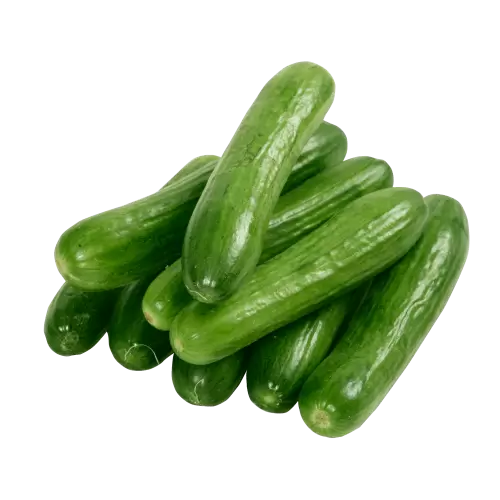CUCUMBER

Wonderful Benefits Of Cucumber
Cucumbers are a beneficial type of produce for overall health and are particularly enjoyed during the summer months given their high water content. They also contain important nutrients that are essential for the human body. Cucumbers flesh is rich in vitamin A, vitamin C, and folic acid, while the hard outer skin is rich in fiber and a range of minerals including magnesium, molybdenum, and potassium.
What is a Cucumber?
Cucumber is a fruit from the Cucurbitaceae family. Scientifically known as Cucumis sativus, it belongs to the same family as zucchini, watermelon, pumpkin, and other types of summer squash. The plant where cucumber grows is a creeping vine that develops these cylindrical, edible fruits throughout the year.
Different varieties of cucumber are grown in different regions of the world. Cucumbers, typically eaten fresh, are called slicing cucumbers. Gherkin cucumbers are specially produced to make pickles (also known as pickled cucumbers). These are much smaller in size than the slicing ones. Slicing cucumbers are available throughout the year, but they are at their best between May and July.
About Cucumber
Cucumbers originated in India almost 10,000 years ago, but are now cultivated in many countries. Different varieties of cucumbers are traded in the international market and you will find them in abundance all year long.
In the ancient civilizations of Egypt, Greece, and Rome, the cucumber was very popular, and its uses were not limited to just being food. It was also praised for its beneficial effects on the skin. Louis XIV cherished cucumbers greatly and the process of cultivating them in greenhouses was invented during his time to make sure he was able to have a steady supply of the enjoyable fruit during any season. The American colonists also took this variety of crunchy and healthy squash to the United States.
It is still unknown when cucumbers began to be used for pickling, but researchers have speculated that the gherkin variety of cucumber was developed from a native African plant. Spain was one of the countries, during ancient times, that started pickling cucumbers since Roman emperors imported them from this Mediterranean country.
Features and Varieties of Cucumbers
You are probably familiar with the phrase “cool as a cucumber”, which speaks directly to the soothing and cooling nature that cucumbers have when eaten. These fruits are grown mainly to be eaten fresh, and in India, you will often find sliced cucumbers being sold on sunny afternoons. They are usually cylindrical in shape and vary in length from about six to nine inches. However, the size of cucumbers varies according to a variety of cultivating factors as well.
The skin of the cucumbers can vary in color from green to white, and sometimes it may be smooth or ridged depending on the variety. Inside the cucumber skin, you will find pale green flesh that is thick yet aqueous and crispy at the same time. The interior core of cucumber has numerous, edible fleshy seeds.
Many cucumber varieties are also grown in greenhouses; they are seedless with thinner skin and a longer length, usually between 12 and 20 inches. Often known as “burpless”, this variety of cucumber is bought by a majority, since it is easier to digest than the other kinds of cucumbers.
Nutrition Facts
Cucumbers are rich in various nutrients, vitamins, minerals, energy, and water. According to the USDA National Nutrient Database, cucumbers are a good source of potassium, phosphorus, vitamin C, and vitamin K. [1] They also provide small amounts of iron, sodium, and B-vitamins (riboflavin, niacin, and vitamin B-6).
Health Benefits of Cucumbers
While the health benefits of cucumber are not widely known in many cultures. The taste of fresh cucumber is somewhat bland in comparison with other squashes, the thirst quenching and the cooling qualities of this squash are truly refreshing. It’s also important to remember that proper seasoning of cucumbers with herbs and spices can make it a great addition to many meals and snacks.
Skin Care
Cucumber is rich in silica, which is an essential component that aids in developing strong and healthy connective tissues in the muscles, ligaments, tendons, cartilage, and bones. Doctors often recommend cucumber juice because of the silica content for healthier and brighter skin. Additionally, research in the journal Nutrition Review [2] highlights the importance of fluids and hydration for the skin health. Cucumber’s high water content makes it naturally hydrating. Ascorbic and caffeic acid are the two vital compounds in cucumbers that help prevent water loss from the body.
The extract of cucumbers is often used topically for treating various types of skin ailments like sunburn and under-eye swelling. They may also be recommended to assist in the treatment of other skin ailments like psoriasis, eczema, and acne. These are some of the reasons why cucumbers are applied topically for various skin problems.
Prevent Constipation & Kidney Stones
Cucumbers are a perfect blend of both fiber and water. Therefore, they help to protect your body from constipation and kidney stones. [3] Regularly enjoying a cucumber rich salad is a great way to increase fiber intake. Cucumber is also a good source of vitamin C, silica, potassium, and magnesium; all of which have their own health benefits. Cucumber skin contains high levels of vitamin A, so you will gain more of this nutrient if you eat the entire thing without removing the skin.
Other Benefits
Cucumbers are low in acidity, meaning they can be tolerated by those with gastric sensitivities. Cucumbers also help normalize body temperature during summer given their high water content. Cucumber juice is a diuretic, so it may contribute to decreasing the likelihood of developing is able to prevent kidney stones too.
Question & Answers
Don't get what you are looking for? Ask Question